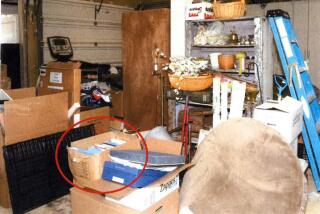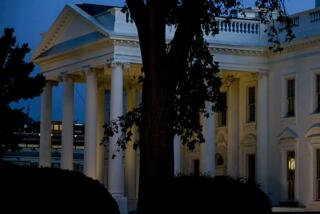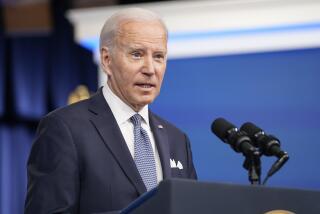U.N. Ends Visits to Presidential Sites in Iraq
- Share via
BAGHDAD — United Nations arms experts went into each of the 1,058 buildings inside Iraqi leader Saddam Hussein’s eight presidential compounds but found most of them empty, an American weapons inspector said Friday.
The inspections were a key test of a U.N.-Iraq accord that averted the threat of war in the region.
The inspectors found no prohibited material or documents during the eight days of searches, said Charles Duelfer, the deputy head of the U.N. Special Commission, which is in charge of dismantling Iraq’s weapons of mass destruction.
Iraq praised the end of the inspections, saying the fact that nothing was found contradicted U.S. and British accusations that the sites contained stockpiles of illegal weapons. Baghdad urged the U.N. Security Council to take steps to lift sweeping U.N. sanctions.
“What has been achieved is a triumph for the truth over falsehood,” Deputy Prime Minister Tarik Aziz said, according to the official Iraqi News Agency. “The visit has verified Iraq’s credibility.”
Inspectors, however, had not expected to find much at the sites and repeatedly had said they wanted to set a precedent of entering sites that Iraq had long said were off limits as symbols of national sovereignty.
The visits, which began March 26, were designed to “establish our right to unrestricted access,” Duelfer said.
Most of the buildings inspected were empty except for a few in the main Republican Palace compound in Baghdad, Duelfer said. There, inspectors came across furniture and office supplies, he said.
Duelfer also refused to speculate on why the buildings were bare. But Iraqi officials said many of the buildings were emptied months ago when tension escalated over Baghdad’s refusal to grant access to the palaces and Iraq feared an attack on the sites.
The Republican Palace was the most sensitive site. The Iraqis opened parts of the compound only to Duelfer, two other senior arms experts and Jayantha Dhanapala, the leader of a diplomatic group monitoring the visits, Duelfer said.
The inspectors will leave Baghdad today, and no date was announced for future visits.
The work of the inspectors at other less sensitive sites is far from over. Richard Butler, the chief arms inspector, has said Iraq still needs to provide more proof to back its claim that it has destroyed all of its biological weapons.
More to Read
Sign up for Essential California
The most important California stories and recommendations in your inbox every morning.
You may occasionally receive promotional content from the Los Angeles Times.













